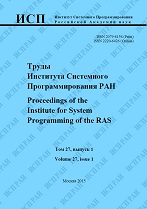|
This article is cited in 1 scientific paper (total in 1 paper)
Domain adaptation by proactive labeling
M. A. Ryndina, D. Y. Turdakovba
a Ivannikov Institute for System Programming of RAS
b Lomonosov Moscow State University
Abstract:
Getting tagged data is an expensive and time-consuming process. There are several approaches to how to reduce the number of examples needed for training. For example, the methods used in active learning are aimed at choosing only the most difficult examples for marking. Using active learning allows to achieve results similar to supervised learning, using much less labeled data. However, such methods are often dispersive and highly dependent on the choice of the initial approximation, and the optimal strategies for choosing examples for marking up either depend on the type of classifier or are computationally complex. Another approach is domain adaptation. Most of the approaches in this area are unsupervised and are based on approximating the distribution of data in domains by solving the problem of optimal transfer or extraction of domain-independent features. Supervised learning approaches are not resistant to changes in the distribution of the target variable. This is one of the reasons why the task of semis-supervised domain adaptation is posed: there are labeled data in the source domain, a lot of unlabeled data in the target domain and the ability to get labels for some of the data from the target domain. In this work, we show how proactive labeling can help transfer knowledge from one source domain to a different but relative target domain. We propose to use a machine learning model trained on source domain as a free fallible oracle. This oracle can determine complexity of a training example to make several decisions. First, this example should be added to training dataset. Second, do we have enough knowldge learnt from source to label this example ourself or we need to call a trusted expert? We present an algorithm that utilize this ideas and one of its features is ability to work with any classifier that has probabilistic interpretation of its outputs. Experimental evaluation on Amazon review dataset establish the effectiveness of proposed method.
Keywords:
domain adaptation, proactive learning.
Citation:
M. A. Ryndin, D. Y. Turdakov, “Domain adaptation by proactive labeling”, Proceedings of ISP RAS, 31:5 (2019), 145–152
Linking options:
https://www.mathnet.ru/eng/tisp460 https://www.mathnet.ru/eng/tisp/v31/i5/p145
|

| Statistics & downloads: |
| Abstract page: | 153 | | Full-text PDF : | 44 | | References: | 27 |
|




 Contact us:
Contact us: Terms of Use
Terms of Use
 Registration to the website
Registration to the website Logotypes
Logotypes









 Citation in format
Citation in format 